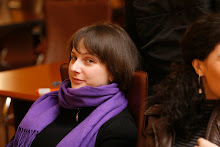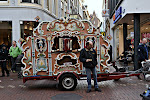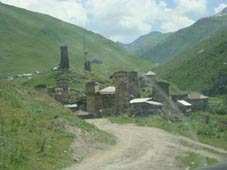Double investigation reveals Russian blame in Storimans’ death
Russian cluster bombs killed Dutch cameraman Stan Storimans, 39, during the war last August.Two independent investigations conduicted after his death.
The first investigation was held by the Dutch government last October.
 The second investigation was compiled into a documentary film and screened Aug. 12, 2009, exactly one-year after Storimans’ death. The 46-minute film was shot by Dutch RTL TV reporter Jeroen Akkermans who worked with Storimans on the day of the tragedy.
The second investigation was compiled into a documentary film and screened Aug. 12, 2009, exactly one-year after Storimans’ death. The 46-minute film was shot by Dutch RTL TV reporter Jeroen Akkermans who worked with Storimans on the day of the tragedy.A special report prepared by the Dutch Permanent Mission to the UN states that, “Dutch cameraman Stan Storimans, who was killed in the Georgian city of Gori on Aug. 12, 2008, was the victim of cluster munitions. The munitions were propelled by a type of rocket that is only found in Russia’s military arsenal. That is the conclusion of the mission that Foreign Minister Maxime Verhagen appointed to investigate the circumstances of Storimans’ death.”
Verhagen stated he regards the findings “extremely serious.”
“I have made this clear to the Russian authorities,” he said. “Cluster munitions must not be used in this way. There were no troops in Gori and innocent civilians were killed.”
The Russian government rebuked the accusations and blamed Georgia in the incident.
“The accident was the result of aggressive actions conducted by the Georgian forces,” President Dmitry Medvedev told a RTL News correspondent. “In this particular case, we arrived at the conclusion based on the fact that the Georgians have recognized their use of cluster weapons.”
He then expressed his condolences to the Storimans family.
In his documentary film, Akkermans uncovers evidence proving that Russian Iskander rockets led to Storimans’ death. Akkermans is RTL’s Germany and Eastern Europe correspondent, and has 20 years of journalistic experience. His work has taken him in to conflict areas such as Chechnya, Georgia, Abkhazia and the Balkans.
While conducting the investigation, Akkermans met with a number of military analysts.
Human Rights Watch Senior Military Analyst Marc Garlasco was in Georgia and participated in examining the exploded materials. He is sure the bombs that killed Storimans were cluster rockets owned only by Russian forces.
“As soon as I saw the cradles I knew they were cluster munitions because of the signature,” he said, noting that the star-shape patterns divulge the Russian origin of the bombs. “I have seen them many times in many other conflicts in Afganistan and Lebanon.”
“I am absolutely certain,” he said.
The Iskander M (NATO reporting name “SS-26 Stone”) was named after the Arabic version, “Alexander the Great” and invented by Russian specialists for Middle Eastern clients.
“The technical characteristics show that this is an absolutely unique missile,” Russian military expert Ruslan Pukhov tells Akkermans in the film. “The Russians became interested in the bomb and then developed the ‘M’ version, which means modernized.”
The missile’s range is about 250 miles and according to Akkermans’ film it can be shot from Dagestan or Chechnya to Gori.
Based on his and Storimans’ coverage last year, Akkermans said that all Georgian troops had left Gori Aug. 11, and the incident occurred the next day when only peaceful citizens and journalists were in the city. The bombing took place on the city’s main square – a flat, open area near the Stalin monument.
“We left our positions,” a Georgian soldier tells reporters in an interview late night Aug. 11, 2008.
Analytical Department head Shota Utiashvili at the Interior Ministry also confirmed that the troops were ordered to leave Gori late afternoon Aug. 11.
“It was a test-rocket shot into Gori,” Akkermans told Georgia Today. “It had no military meaning. It was only a gesture to show their power to Georgia, to threaten peaceful locals, and to enhance the spirit of war in their soldiers.”
In Akkermans film, German military expert Robert Schmucker states that the rocket had a psychological as opposed to military impact on the Georgian people.
Several Gori residents died together with Storimans.
A number of wounded people survived, including Akkermans, who sustained minor injuries to his leg. Israeli journalist Zadok Yecheskeli still has problems moving.
“I will never be able to run again, ski or play tennis,” Yecheskli says in the film. “But I do not concentrate on what I cannot do. I think about what I can do. I realized that I can function as a journalist, I can walk and ask questions.”
Yecheskeli came to Georgia after the war to conduct the ivestigation with Akkermans.
Akkermans noted another reason for holding the investigation.
“After a war, journalists have the task to find out what really happened,” he said. “Georgia like other countries wants to close the book and forget about the war. But we have to find out the truth and make the governments feel and meet their responsibilities.”
In one segment of the documentary Akkermans says Russia’s blame in the tragedy does not free Georgia from its own responsibility. As both countries used cluster bombs, the same tragic accident could have occurred in some South Ossetian towns, he states.
Akkermans is eager to screen the film in Georgia under the condition that it is translated honestly and shown from the beginning to the end.
Neither Georgia, who recognized its use of cluster bombs during last year’s war, nor Russia, who denied using these munitions, has signed the international convention prohibiting the use, stockpiling, production and transfer of cluster bombs. The convention was adopted in Dublin by 107 states on May 2008 and signed on Dec. 3 the same year.
Anna Chichinadze
21.08.2009






